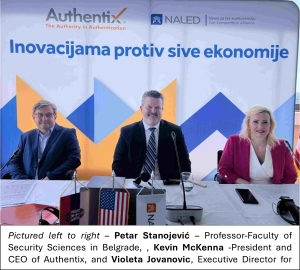 Belgrade, Serbia and Addison, Texas USA – On the 3rd through 4th of June 2025, Authentix and The National Alliance for Local Economic Development (NALED) organized and hosted the National Programme to Combat the Grey Economy in Serbia with business leaders and other key officials to discuss both their recent findings and plan a way forward with a five year plan. During the two day event, Kevin McKenna, President and CEO of Authentix, had the opportunity to present advanced authentication solutions to a wide audience, met and exchanged views with the Serbian Minister of Economy as well as with representatives of some of the largest companies operating in Serbia. These solutions are part of an overall effort to implement a formal plan to fight against the grey economy in Serbia for the period 2026-2030.
Belgrade, Serbia and Addison, Texas USA – On the 3rd through 4th of June 2025, Authentix and The National Alliance for Local Economic Development (NALED) organized and hosted the National Programme to Combat the Grey Economy in Serbia with business leaders and other key officials to discuss both their recent findings and plan a way forward with a five year plan. During the two day event, Kevin McKenna, President and CEO of Authentix, had the opportunity to present advanced authentication solutions to a wide audience, met and exchanged views with the Serbian Minister of Economy as well as with representatives of some of the largest companies operating in Serbia. These solutions are part of an overall effort to implement a formal plan to fight against the grey economy in Serbia for the period 2026-2030.
NALED is an independent, non-profit and non-partisan association of businesses, local governments and other interested parties who have joined the fight against the underground economy and illicit trading. Mr. McKenna discussed to a wide audience, the possible solutions that can be implemented and met with journalists organized by NALED on June 4 in Belgrade, where the results of a decade of work on the subject were presented.
In 2014, NALED Competitiveness and Investment Council was created. The following year, the Coordination Body and the Expert Groups were constituted and the National Programme to Combat the Grey Economy was launched. A lot has been done with the help of digitized services and applications: from e-taxation, e-invoices, hiring seasonal workers in agriculture to e-taxation.
Presentation of the report on the fight against the underground economy was provided on June 4 in Belgrade by Petar Stanojević, Kevin McKenna and Violeta Jovanovic. According to an analysis carried out by NALED, it has been shown that the underground economy in Serbia remains at approximately 21%. This means that several billion euros are still ‘spinning’ in Serbia’s grey zone,” said Violeta Jovanović.
Petar Stanojević, a professor at the Faculty of Security Sciences in Belgrade, estimated that a 21% grey economy in Serbia could amount up to 18 billion euros annually based upon the country’s GDP. This is why, he says, “It is a good time to invest in the fight against the grey economy in Serbia.”
Kevin McKenna, President and CEO of Authentix, was one of the featured guests at the presentation of the NALED report. He said that through the country’s fuel integrity system, implemented 10 years ago by Authentix and its key in-country partners, Nanoinspekt and SGS, more than 1.4 billion euros of additional revenue have flowed into the Serbian budget since the beginning of the program. Mr. McKenna further indicated, based on the longstanding fuel integrity program, Serbia also has the highest quality motor fuels in the region.
 McKenna further stated that Authentix cooperates with the U.S. Federal Reserve Bank To control and inspect all the banknotes in the U.S. banking system. “For more than a decade, we have been helping countries, companies, and central banks preserve the value of their resources and brands. Through our smart marking, labeling, tracking, and detection solutions, we can protect most any supply chain. In Serbia and in the Balkans, we operate through a local Serbian based distributor, Nanoinspekt, that provides everything – from the import of markers, technical support, distribution, and cooperation with state institutions to raising public awareness. Our mission is clear: to safeguard the integrity of global commerce by delivering innovative authentication solutions” explained Kevin McKenna, President and CEO of Authentix.
McKenna further stated that Authentix cooperates with the U.S. Federal Reserve Bank To control and inspect all the banknotes in the U.S. banking system. “For more than a decade, we have been helping countries, companies, and central banks preserve the value of their resources and brands. Through our smart marking, labeling, tracking, and detection solutions, we can protect most any supply chain. In Serbia and in the Balkans, we operate through a local Serbian based distributor, Nanoinspekt, that provides everything – from the import of markers, technical support, distribution, and cooperation with state institutions to raising public awareness. Our mission is clear: to safeguard the integrity of global commerce by delivering innovative authentication solutions” explained Kevin McKenna, President and CEO of Authentix.
The group also discussed how to further develop the new five-year plan. The first step towards implementing the Grey Economy Suppression Programme is the identification of innovations that can be part of a systemic solution. Certainly, one of the keys to success along with the implementation of advanced technology is a highly effective enforcement strategy. It was noted that the average age of a government inspector in Serbia is 51 years, and there are fewer than 3,000 active inspectors. This can severely limit the system’s capacity going forward. Therefore, a key strategy is based on new employment of additional inspectors and the modernization of work through the full implementation of an E-Inspector platform.
